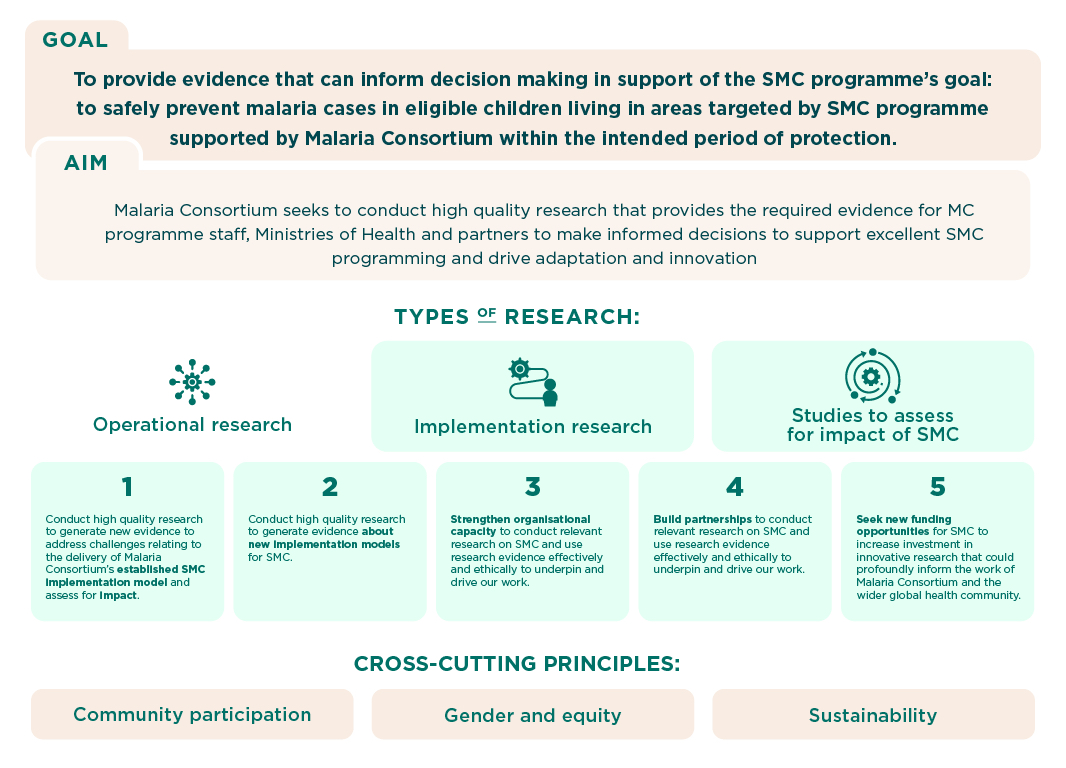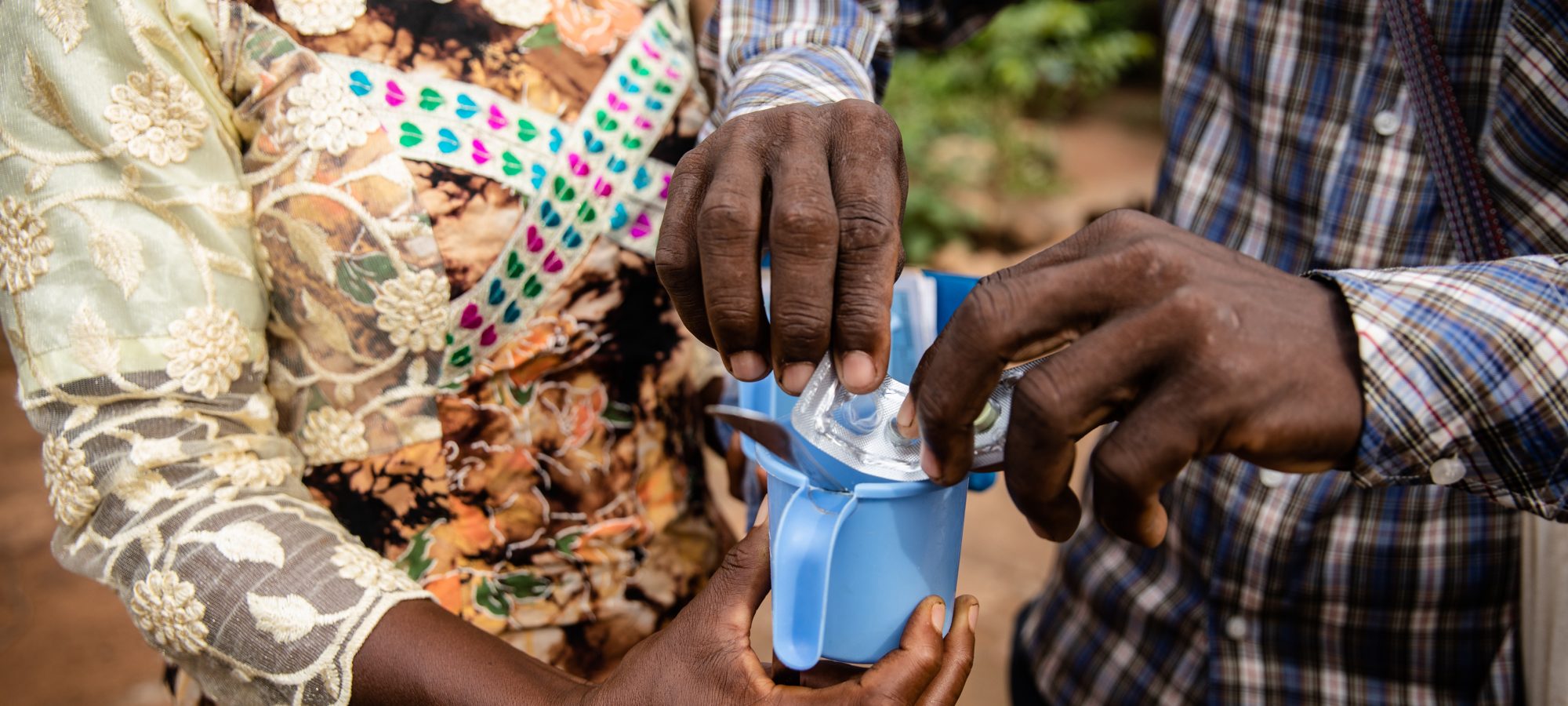Malaria Consortium is launching a new seasonal malaria chemoprevention (SMC) research strategy. As a leading implementer of SMC, we strive to use research evidence to improve programme performance and the quality of SMC implementation. We spoke to Research Advisor Dr Kevin Baker and Senior Research Specialist Charlotte Ward about how the strategy was developed and how it will drive our research over the next two years.
Why an SMC research strategy and why now?
Malaria Consortium’s global SMC research strategy defines our aims and objectives for the next two years. We have recently become one of only two UK-based NGOs to have been awarded Independent Research Organisation status, which makes it an ideal time to think strategically about our future research ambitions. Over the past two years, we have strengthened our research capacity and conducted several national and programme level research studies. For example, we have explored the co-implementation of vitamin A with SMC in Nigeria, we have investigated SMC implementers’ adherence to infection prevention and control measures during COVID-19 across West and Central Africa and we have extended SMC to five cycles in Burkina Faso and explored its feasibility and acceptability to a range of key stakeholders. We used the recommendations and learnings from our research to consider new research priorities, cross-cutting principles and the resources required to add maximum value to the evidence base for SMC in the Sahel and East and Southern Africa going forward.

How have we created this strategy?
We began by appraising the global evidence base for SMC to understand where the evidence gaps are for key topic areas: impact of SMC on health outcomes, implementation fidelity, delivery models for SMC, alternative drug regimens and parasite resistance. Because SMC is implemented under the leadership of national malaria programmes, it was also very important for us to discuss and understand research priorities in each of the countries we support.
The strategy has five core objectives. The first two objectives outline the type of research we will do and are informed on an ongoing basis by conversations between our research teams and national governments about the emerging research needs. Looking forward, we’ll be continuing this dialogue to ensure our activities stay aligned with these priorities.
The other three objectives focus on strengthening organisation capacity to conduct research on SMC and use evidence effectively and ethically, collaborate with international and local academic institutions and seek new funding opportunities to increase investment in innovative research.
Now the strategy is in place, what is the current priority for SMC research?
Broadly speaking, SMC is still delivered according to the WHO policy recommendation of four monthly SMC cycles per annual round, targeting children under five in the Sahel. However, there are a number of key areas of innovation being discussed at the global and national level. They are being tested to various degrees and require research evidence to support their roll out, specifically:
- Varying the number of cycles and expanding to areas with slightly longer transmission season;
- Expanding the age range;
- Integration with other health services;
- Expansion to new geographical areas;
- New drug regimens.
How does the strategy affect our work with local research partners?
All of Malaria Consortium’s malaria research is conducted in collaboration with national malaria programmes. In addition to this, one of the strategy’s objectives is to build collaborations with other partner institutions including international, national and local universities and government health departments that contribute complimentary resources or skills, have an aligned geographical focus, have access to target populations or whose involvement will improve acceptability or feasibility of the research.
We are also leading on the creation of a research sub-group of the SMC Alliance – (a global SMC working group under the RBM Partnership to End Malaria). Once in place, the sub-group will provide a platform for the SMC community to exchange research findings and good practice, discuss evidence gaps, research priorities, and opportunities for research dissemination.
In addition, forming local research partnerships can create opportunities for research staff to enrol in PhD programmes, which aligns with the third objective of our strategy around strengthening organisational capacity.
One of the cross-cutting areas of the strategy relates to sustainability. How will this be factored into SMC research?
Firstly, we want to build the foundations for high-quality research to take place on a continual basis with research questions being generated and investigated locally. Secondly, we want to strengthen the longer-term viability of the SMC programme. For example, we are interested in exploring solutions that promote horizontal health system strengthening, as was piloted in our recent vitamin A and SMC co-implementation study. It is possible that integrated programmes will be more attractive for domestic funders in future. We also want to increase focus on scalability after pilots are completed so that innovations can be adopted by national malaria programmes and integrated into health systems.
Another of the strategy’s cross-cutting areas relates to community participation. How can communities be brought into the research process?
We recognise that SMC is an intervention for and delivered by members of the community. For any research that we design, we want to engage with communities at every stage to ensure that the results are meaningful for them. So, during the design process we are respectful and responsive to the health needs of communities and frequently use participatory approaches. When we recruit people into our studies, we ensure there is a clear understanding about what participants are giving consent for and feel completely comfortable to be involved. This also ties in with the general need to sensitise entire communities about the research being carried out. Ultimately, this is all governed by Malaria Consortium’s Research Evaluation and Ethics Policy which provides a consistent ethics procedure across all of our research projects.
In summary, what does this new strategy mean for Malaria Consortium’s SMC programme?
Malaria Consortium is committed to developing the SMC evidence base to ensure that our SMC programme, Ministries of Health and other partners make informed decisions that support SMC programming. Malaria Consortium strives to be a global leader in SMC research and this strategy is the first step towards that goal. We carry out research from a unique position: we are SMC implementers – reaching 12 million children across the Sahel region with SMC in 2020 – and we also have a strong team of researchers across our organisation that are well-positioned to implement research.
Learn more about our research on seasonal malaria chemoprevention research on our dedicated page.
Further reading
Malaria Consortium awarded prestigious Independent Research Organisation Status
